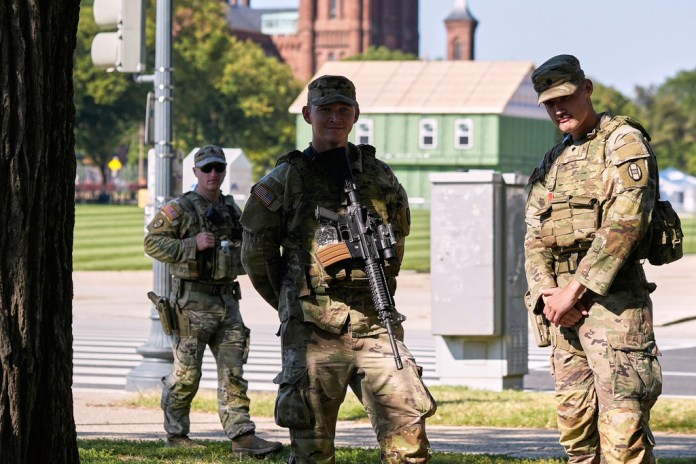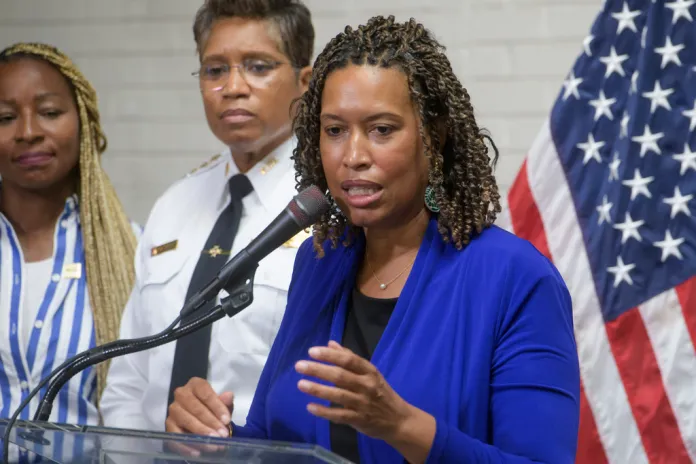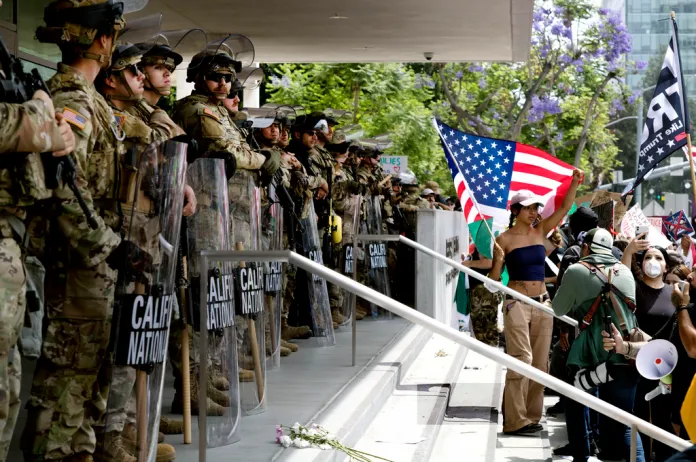President Donald Trump and his MAGA agenda are not shy when it comes to bending conservative norms. In his second term, states’ rights, once a rallying cry for conservatives, are under pressure. Trump has strong-armed private companies and universities, and is testing the approach to free speech, while showing flexible foreign policy when it comes to adversaries like China. This Washington Examiner series, Upend the Orthodoxy, will take an in-depth look at all of these.
States’ rights, once a predominant rallying call for conservatives, are under a new form of pressure as President Donald Trump implements his agenda across the country, forcing Democratic leaders into state sovereignty positions often touted by Republican leaders.
Facing a second Trump administration that is exercising federal power more aggressively than any in recent memory, Democratic governors and attorneys general are scrambling to embrace those very constitutional principles as their line of defense. From the streets of Chicago to the locker rooms of Virginia schools, blue states and localities are mounting a full-scale legal resistance to Trump’s expanding reach. Democratic governors like Gavin Newsom in California or JB Pritzker in Illinois challenged Trump’s vows for troop deployments in large-scale metropolitan areas, fighting immigration surges, and suing over funding tied to civil rights policies.

“Democrats are perfectly fine to take advantage of federalism when it suits them while also attacking Republicans when they are in power,” said John Shu, a constitutional law expert who served in both Bush administrations. “There is definitely some hypocrisy. Democratic state attorneys general brag all the time about how they’re suing the Trump administration over and over again.”
The principles of federalism were displayed throughout former President Joe Biden’s single term in office, from states countering his sweeping plan to forgive millions of student loan borrowers to states like Texas reinforcing its border with Mexico to dozens of states fighting against COVID-19 vaccine mandates. The roles are now in reverse as Trump emphasizes a need to curb what he sees as rampant violence in major cities, immigration law violations, and areas where left-wing civil rights policies are rampant.
The president’s team argues that blue states are obstructing federal enforcement and undermining national security, especially on issues like immigration and violent crime, relying on the latest crackdown in Washington, D.C., as a template for cleaning up metropolitan centers across the nation. With legal fights now underway across at least four federal circuits, the question of how much power states really have to resist Washington will likely see court battles all the way to the Supreme Court, notwithstanding any surprise deals made between the administration and local governments along the way.
Bowser backs down as lawsuit challenges DC Guard presence
Perhaps the most surprising turn came last week in Washington, where Democratic Mayor Muriel Bowser issued an executive order compelling district agencies to cooperate fully with federal law enforcement.
Trump’s deployment of National Guard troops in the district, a federal enclave, drew criticism from activists but gratitude from Bowser, who said the presence was “greatly appreciated.”

“Thanking Trump for his latest law-and-order move is just the latest sign that Bowser has come a long way,” wrote Emily Jashinsky in a post on UnHerd, noting that the mayor had once declared the district a “proud sanctuary” and established Black Lives Matter Plaza, both of which she has since walked back.
Bowser’s reversal stood out, given her past clashes with federal officials during the 2020 George Floyd protests. However, legal realities are also far different in Washington, where the president has direct command over the National Guard and broader emergency authority.
That did not stop District of Columbia Attorney General Brian Schwalb from suing to block the deployment. His office argues that the continued presence of more than 1,000 federalized National Guard members constitutes an “unauthorized military occupation” that violates separation of powers principles.
Trump said Friday, “We just set a record on low crime in Washington, D.C., and we have a man suing us to go back to high crime,” noting that Schwalb’s office is separate from Bowser’s.
“We now have one of the safest cities in the country,” Trump said, boasting that he would win out against any lawsuit by the district’s attorney general.
White House officials counter that the troops are being used solely to support federal operations and protect personnel. The case is now one of several early tests of how far Trump’s National Guard authority can extend during peacetime without explicit congressional approval.
Breyer’s ruling in California highlights legal risks but also limits
In California, a federal district court ruled last week that the Trump administration’s use of National Guard troops in Los Angeles violated the Posse Comitatus Act, which prevents using the military for civilian law enforcement activities such as arrests or searches.
Judge Charles Breyer, an appointee of former President Bill Clinton and the brother of retired Supreme Court Justice Stephen Breyer, found that the National Guard’s support of immigration enforcement during protests blurred the line between military support and civilian law enforcement despite the troops only accompanying Immigration and Customs Enforcement officers during violent unrest in the city earlier this summer.

The ruling marked the second significant yet temporary legal setback for the administration relating to the National Guard deployment operation in the Golden State. But it was immediately stayed pending appeal. The Trump administration announced its appeal to the U.S. Court of Appeals for the 9th Circuit on Wednesday, which has signaled that it will hear the case expeditiously.
John Malcolm, vice president at the Heritage Foundation‘s legal center, said he believes Breyer’s ruling will be overturned.
“There is an exception to the Posse Comitatus Act when you are protecting federal property or protecting federal officials executing federal law, and local police are unwilling or unable to assist them,” Malcolm said. “In Los Angeles, that was clearly the case.”
Malcolm added that Trump has every right to prepare National Guard deployments in cities like Chicago if local authorities appear unwilling to support ICE operations or protect federal agents.
“That is a closer question than what happened in either D.C. or L.A., but it is not unjustified,” he said.
Pritzker and Newsom gamble on legal escalation
Pritzker has repeatedly warned that he will sue if the White House sends National Guard troops into Chicago without state approval. The Pentagon has already authorized the use of Naval Station Great Lakes to support an immigration enforcement campaign targeting the city and surrounding suburbs.
“There’s no emergency that warrants deploying troops in Chicago,” Pritzker said last week. “He’s insulting Chicagoans by calling our home a hellhole.”
Newsom has taken a similar line, accusing Trump of using military assets like a private army.
Pritzker and Newsom are widely seen as possible 2028 Democratic contenders, and analysts suggest their resistance is calibrated to boost progressive credibility heading into the primary season.
But their defiance also risks accelerating a national legal confrontation. Legal scholars who spoke to the Washington Examiner said that by digging in now, Pritzker and Newsom may be trying to force the Supreme Court to clarify the limits of federal power over state and local enforcement.
“It would not surprise me if we see more states push this all the way,” Malcolm said. “The circuits are split on some of these questions, and the current court is very likely to side with the administration in most cases.”
Immigration crackdown continues despite early setbacks
Trump’s Justice Department is also escalating its efforts against sanctuary jurisdictions.
After a broad lawsuit against Illinois’s Trust Act was dismissed on anti-commandeering grounds, the administration shifted to narrower attacks. It is now suing the city of Boston over its noncooperation policies, and more suits are expected soon.
Malcolm said the legal strategy is evolving.
“The administration is being more aggressive,” he explained. “They are saying that by declaring yourself a sanctuary jurisdiction, you are not just declining to help. You are actively interfering with federal enforcement.”
ICE has begun staging agents from federal property in cities that refuse to cooperate, using bases, warehouses, and ports of entry to bypass local resistance. Malcolm noted that while states cannot be forced to enforce immigration law, they also cannot shield illegal immigrants or prevent federal agents from doing their jobs.
Trump is also considering targeting blue cities in red states, such as New Orleans, a move that Malcolm said could function as demonstration projects to show the benefits of federal enforcement. Likewise, Democrats are goading Trump into taking the plunge to bring the National Guard into a red state, including Sen. Dick Durbin (D-IL), who said at a press conference Friday that Trump should focus his attention on those locations.
Trump on Friday declined to say where he would send the National Guard next but suggested he would also consider sending federal support to Portland to combat “paid agitators.”
“If we got to Portland, we’re going to wipe them out,” he said, adding, “What they’ve done to that place, it’s like living in hell.”
Education fight in Virginia may set up Supreme Court review
The administration has also faced a legal battle against five northern Virginia school districts over their transgender policies, which the Department of Education says violate Title IX by denying protections for biological females in sports and private facilities.
Fairfax and Arlington counties sued last week after being placed on reimbursement-only status. Their defense relies heavily on the U.S. Court of Appeals for the 4th Circuit precedent, particularly a case known as Grimm v. Gloucester, and B.P.J. v. West Virginia, which upheld limited access to bathrooms and athletic teams for transgender students. However, in an early victory for the administration, a federal judge in Alexandria denied a restraining order request from Fairfax County and Arlington Public Schools to stop the funding freeze and suspended the cases for the time being.
Malcolm said the 4th Circuit, which once had a reputation as one of the country’s most reliably conservative appellate courts, has shifted significantly to the left in recent years. He explained that this shift makes it more difficult for the Trump administration to win cases in that jurisdiction, particularly on issues like Title IX, transgender policies, and federal education enforcement. Malcolm said the circuit is generating decisions inconsistent with rulings from other appellate courts, contributing to circuit splits that are likely to draw the Supreme Court’s attention.
“The idea will be to create political issues and circuit splits and offer better results at the Supreme Court. And bet you, most of the time the administration will prevail before the Supreme Court,” Malcolm said.
However, Virginia’s policies go well beyond those rulings. The Office for Civil Rights under the administration said this creates unfair conditions and forces other students to change their behavior and possibly even expose themselves in vulnerable locations, such as locker rooms, to the opposite sex to accommodate a small minority.
The Supreme Court has already agreed to review the B.P.J. case this term, signaling that national clarification may be on the horizon for matters pertaining to sports teams and bathroom policies. After the court’s ruling this year in United States v. Skrmetti, which reinstated a rational basis test for gender-related laws, many legal observers believe the conservative majority may also side with the administration in the bathroom case.
Trump pushes wedge issues with public backing
Despite the relentless litigation and partial setbacks, Trump appears to pick his fights strategically and deliberately.
“He is picking what he believes to be 80/20 issues,” Malcolm said. “Crime is one of them. Immigration is another. Most people are going to support him on these issues, especially when cities are visibly struggling.”
Polling bears that out. A majority, 53%, of the country approves of the way Trump is handling crime, a stronger showing than his overall job approval or his ratings on most other issues, according to an Aug. 27 poll from AP-NORC Center for Public Affairs Research.
NEWSOM COMPARES CALIFORNIA’S HOMICIDE RATE TO RED STATES. DOES HE HAVE A POINT?
Bowser may have seen that writing on the wall. Her pivot, though unusual, may buy her leverage in future talks over Washington’s status.
But for likely Democratic presidential hopefuls such as Pritzker and Newsom, they appear to be daring Trump into a broader legal showdown that is determined to present an all-out fight before courts settle these disputes once and for all.























